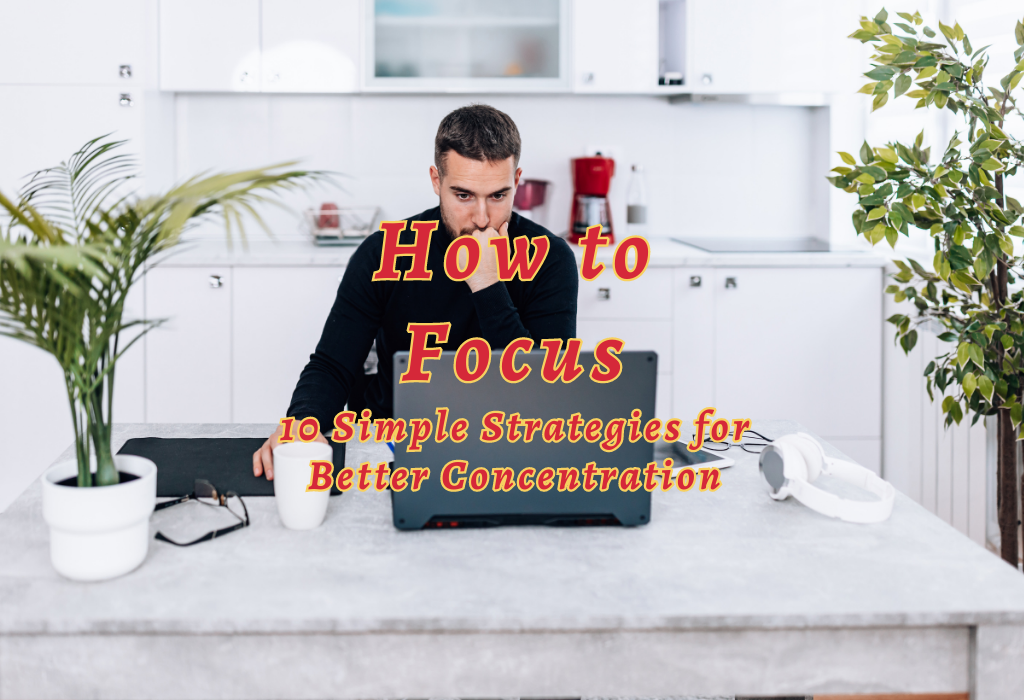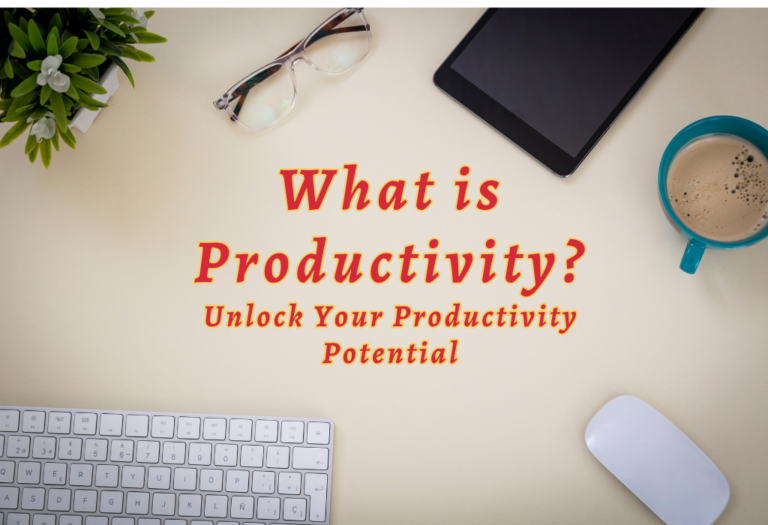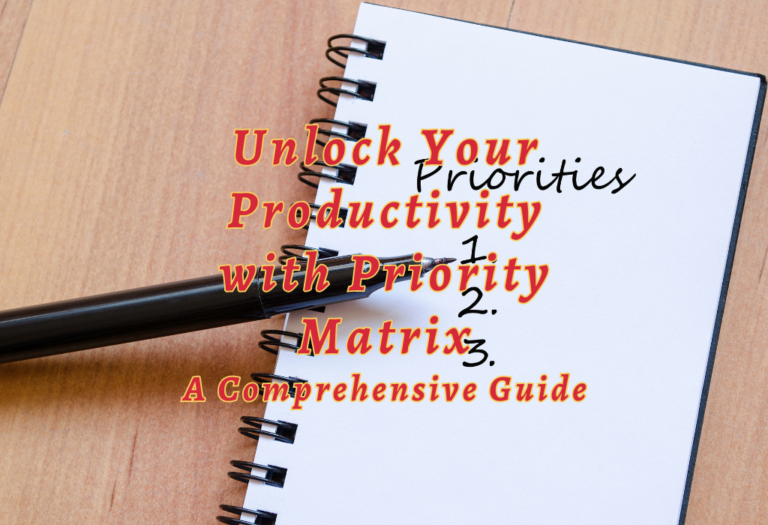How to Focus: 10 Simple Strategies for Better Concentration
If you’ve ever found yourself stuck in a mental rut, distracted by everything in your environment, and unable to get to the task, you’re not alone. Here at the blog, we’ve been just as frustrated with this “focus fatigue” as everyone else. So today, to get us (and you!) on the road to better concentration, we’re bringing you ten simple strategies for better focus.
Whether you’re trying to get through your to-do list, get through the day without being distracted, or work to the best of your abilities, these strategies will help keep you on track. So read on for our guide to getting focused and staying that way – and wave goodbye to your days of wandering minds!

Quick Clarification
Practicing regular mindfulness exercises and setting achievable goals are effective ways of improving focus and concentration. Eating healthy, regular exercise, and taking breaks throughout the day can help you stay focused.
Improve Your Environment to Focus
Improving your environment to facilitate better focus is essential for success. Here are a few tips:
On the other hand, it’s only sometimes feasible to establish a different workplace; some people may live in small apartments or have limited space that doesn’t allow them to create an office area. Others may travel frequently and face the challenge of trying to stay productive with unreliable internet connections in different locations.
Improving one’s environment is an essential step towards better focus. Now let’s explore strategies for eliminating distractions for increased concentration:
Main Summary Points
Establishing a dedicated workspace separate from one’s living area can help improve focus and minimize distractions. Thinking critically about how your space is organized and paying attention to sounds or objects that are taking away from productivity is essential. To create a conducive environment, noise-canceling headphones or videos can be used, or relocated noisy machines can be used when possible. Ultimately, developing strategies for eliminating distractions will result in increased concentration.
The ability to eliminate distractions directly affects one’s ability to concentrate and complete tasks efficiently. By ensuring a distraction-free environment and being mindful of our behaviors, we can improve our concentration significantly and stay productive all day long.
How can I use technology to develop and maintain focus?
Technology can be an invaluable tool to improve your focus and concentration. Utilizing apps, websites, extensions, and other technological solutions can help you stay on track and focused on your tasks. Here are a few suggestions on how to use technology to develop and maintain focus:
1. Use a productivity app or website.
Apps like Todoist, Focus Pomodoro Timer & Tracker, and Forest are great tools for managing and tracking your work and helping you achieve better levels of focus. These apps allow you to set goals and reminders, block out distractions, and monitor your progress.
2. Leverage browser extensions
Use StayFocused and WasteNoTime to limit your time on particular websites or even block them if needed.
3. Invest in noise-canceling headphone
This way, you’ll be able to tune out both physical and mental distractions so that nothing distracts you from the task at hand.
4. Silence all phone notifications while working
It is essential when trying to focus! Being constantly bombarded with text messages, emails, or calls can quickly derail our focus, so slowing down digital notifications helps eliminate this risk.
5. Use concentration playlists
You can create playlists on sites like Spotify or YouTube for ambient music or have calming sounds playing in the background to keep you focused.
It is important to note that using technology should supplement rather than replace traditional methods, such as breaking tasks into smaller pieces, setting deadlines, following an agenda/schedule, etc., as these are more reliable tools for achieving better concentration levels.
How to keep Your Desk Area Organized to stay Focused?
Organizing your desk area is an essential part of staying focused. Being surrounded by a neat and organized workspace can help reduce stress and confusion, making it easier to focus on the task. On the other hand, some thrive in an environment of controlled chaos and find that tidying their desk only encourages restlessness and distracts them from their mission.
Organizing your desk area should be tailored to your own needs, but several general steps can help to keep any workspace productive:
1. Clear away the clutter
Start by clearing away items that don’t belong on your desktop and placing them in designated storage areas elsewhere in the office or home. It’s also a good idea to sort through office supplies like folders, post-it notes, paper clips, and more, discarding any old or unnecessary items.
2. Arrange frequently used items within easy reach
Place the items you use most often (e.g., paperwork, notepads, pens, phone) near your desk so you can quickly access them when needed. You can also use dividers and organizers to keep smaller items (like paperclips or memory cards) neatly stored in one place.
3. Utilize wall space
Consider freeing up desk space by utilizing wall space such as bulletin boards or mounting supplies on or near your desk. It will help keep your desk area clutter-free and make it easier to locate items when necessary.
4. Label items
If applicable, label areas of your workspace where you store various items. It helps quickly identify objects, so you save time searching through drawers or bins to find something specific.
5. Set aside “work-only” areas
Dedicate certain zones of your office solely for work-related activity; this may include separate spaces for creative and analytical tasks. It helps create boundaries between work and home relaxation, which will help you focus during work hours and relax when it’s time to go home.
By keeping your workspace organized and tidy, you can significantly increase efficiency while minimizing distractions from clutter – whether that means thoroughly tidying up or leaving some order amongst the chaos – improving concentration and focus on the task at hand.
Next up, we’ll look at how setting and prioritizing goals can help with better concentration – focusing our energy on what matters most in order to get things done successfully!
Set and Prioritize Your Goals
Setting and prioritizing goals is essential for proper focus and concentration. Plans can provide the motivation and structure needed to achieve desired results. Having specific, achievable objectives helps you stay on track instead of getting overwhelmed by more abstract tasks. To set and prioritize your goals, try the following steps:
1. Sorting Goals
First, list out all of your long-term and short-term goals. By doing so, you’ll be able to identify better what needs to be done to reach each goal. Consider categorizing them into professional or personal endeavors for clarity.
2. Setting time
Next, consider how much time or effort you want to put into each goal and decide what is most important for you to focus on first. Noting when something is urgent or non-urgent can also help you determine the order in which tasks get completed.
3. Realistic Goals
When making your list of goals, it’s important not to establish overly aggressive expectations. Remember – Rome wasn’t built in a day! By having realistic goals, you are more likely to be successful at achieving them as opposed to quickly becoming overwhelmed if they seem like too much of a stretch all at once. On the other hand, setting challenging goals can help motivate you and push you further than if they were too easy. The key is to find a happy medium that works best for you.
4. Developing a Path
No matter what approach you take when organizing your goals, make sure that there is always a clear path towards progress towards each one. It will give the purpose and direction of your efforts and help maintain focus throughout the process.
5. Refer Back to your Goals
Finally, use your written list of goals as a point of reference throughout your journey toward focus and concentration. Constantly referring back to it will keep you motivated and remind you of where your efforts should be directed so that even if obstacles arise along the way, you can still remain dedicated toward the end goal.
With these strategies in mind for setting and prioritizing goals, tackling big tasks in smaller chunks becomes significantly more accessible – but first, let’s explore how breaking down big projects into achievable steps further improves focus and concentration.
Break Down Big Goals
When people have big goals, it can be overwhelming and easy to get discouraged when the end goal seems out of reach. Breaking these big goals into smaller, more achievable tasks can make them less daunting and more attainable. For example, if you want to write a book, start by setting up an outline and writing a chapter-by-chapter summary. Then break each chapter into individual paragraphs or scenes, so you can focus on one manageable section at a time. Once each piece is complete, you’ll be able to look back and see your progress toward success.
Benefits
Let’s debunk some benefits of breaking down your goals.
Now that we’ve discussed how breaking down big goals can help us focus better, let’s move on to the next section. In the next section, we’ll discuss how good practicing habits can help us stay motivated and focused on our goals.
Practicing Good Habits to Stay Focused
Practicing good habits is vital to staying focused.
1. Prioritizing Tasks
A significant first step is to prioritize tasks by their importance and urgency. Placing the most important or urgent tasks at the top of your list will allow you to focus on achieving them before moving on to less vital tasks.
2. Decluttering workspace
It’s also important to commit to decluttering your workspace and inbox—having a tidy area has been proven to reduce mental stress, enabling one to be more productive. Furthermore, taking breaks can be beneficial in increasing productivity, but they should be scheduled throughout the day and should not exceed twenty minutes each time. Breaks should consist of activities that improve focus, such as walking outside or disconnecting from digital devices completely.
3. Setting Boundaries
Lastly, setting boundaries with work and leisure activities is essential if one wishes to stay focused on tasks. It’s easy for hours of procrastination to occur when working on a laptop or phone due to easy access to multiple distracting activities such as social media, gaming, and streaming services. It’s best to limit how long a workout should take and stick to it.
Making these small changes can significantly benefit one’s concentration when completing tasks. And speaking of attention, scheduling time for challenging tasks is essential. By breaking up more significant functions into more manageable pieces each day, one can remain focused throughout their work session without becoming overwhelmed by unfeasible goals.
Techniques to Enhance Focus
When focusing, the most important thing is to practice mental clarity and lift your spirits through a few simple strategies. Here are ten techniques to enhance focus:
1. Exercise Regularly
Exercise and physical activity boost oxygen circulation and release natural pain relievers like endorphins. By exercising regularly, your body triggers rewards for promoting concentration and attention.
2. Set Aside Distractions
Eliminate distractions in order to stay focused on the task at hand. Shut off all phones, put work away from social media notifications, designate specific times for checking email, etc. It will be beneficial to stay in a single environment that encourages concentration and allows uninterrupted work time.
3. Manage Your Stress Levels
Stress can impair memory, and some studies suggest that it limits information processing efficiency. Find healthy ways to deal with stress, such as meditation, yoga, or simply having silent mindfulness throughout the day.
4. Take Breaks
Taking breaks helps reenergize the mind and refreshes focus levels so one can go back to work feeling more productive than when they started. It can also help clear thoughts by stepping outside or taking a quick walk around the office building or home during break times throughout the day!
5. Eat Healthy Foods
Consuming nutrient-rich foods boosts brain power, leading to an alert focus state. Eating food rich in Omega-3s (salmon, mackerel, anchovies) helps boost cognitive performance by enhancing memory recall which keeps you motivated to focus on tasks longer and better!
6. Live Mindfully
Live with purpose each day by setting goals rather than just going through tasks absentmindedly. Being mindful of how we spend our time reinforces discipline in staying focused for extended periods.
7. Sleep
The quantity and quality of sleep we get have been proven to improve cognitive functions like awareness, reaction time, and creativity – three essential traits when trying to focus better! Ensure that you schedule enough time for quality rest to perform optimally during waking hours
Practical Tips to Stay Focused
Here are the key ways to stay focused:
1. Utilize Motivation for Progress
Motivation is crucial to progress when attempting to focus. Doing something challenging can be difficult and, as a result, demotivating due to lack of success or immediate reward. Recognizing and rewarding yourself for even minor achievements can motivate you to continue pushing forward. Setting intermediate milestones and goals is critical, as this will provide incentives along the way and keep the process of focusing manageable and achievable. Additionally, be self-aware of how you learn best and harness that process to create an enjoyable experience around learning. Listening to music or studying with friends can help sustain your focus if it is an activity that works for you.
Finally, utilize motivation by being conscious of how things are going during the task at hand. Reevaluate your approach when needed and become aware of how many breaks you need in order to stay productive rather than mindlessly scrolling through social media or watching TV. Redefine what success looks like in this particular area of your life so that achieving it becomes more realistic and attainable while still motivating you toward progress. With these simple strategies, employing motivation should be the driving force behind improved concentration and focus.
2. Incorporating Movement & Creative Activity
Incorporating movement and creative activity into a routine has increased concentration, reduced stress, and boosted energy and productivity. Many studies have been conducted analyzing the influence of physical fitness on cognitive performance and the vast majority point to an undeniable correlation between moving more and experiencing enhanced problem-solving skills, processing speed, motivation, self-confidence, and improved overall well-being.
3. Incorporate Physical Activity
One strategy for incorporating movement is to include a flexible physical activity into the day. It could take stretching or yoga sequences in the morning before starting the day’s tasks, walking during lunch hour, or doing quick exercises at regular intervals while working. Short, active breaks throughout the day help focus, attention, and concentration levels and provide a refreshing reset. Additionally, enlisting friends or colleagues to join as accountability partners is a great way to stay on track with healthy habits.
4. Art Making
On the other hand, creative activities such as art-making or journaling can also help to sharpen the focus by providing an alternate outlet to expend extra energy or take a break from monotonous tasks. Allowing the mind to wander helps to exercise the muscle of creativity while lessening stress responses in the body. Creative activities provide access to our innermost thoughts when words are not enough and offer unique insight into our psyche. Art-making alone can be therapeutic as it allows our minds to rest from complex thinking tasks by engaging with more sensory elements like color, texture, and form.
When done strategically–moving regularly and engaging in creative activity–studies have shown that it enhances concentration by encouraging improved sleep patterns and increasing oxygen levels in the brain, allowing us to concentrate better and think clearly under pressure.
5. Mind-Wandering for Creativity
Mind-wandering may seem counterintuitive when it comes to improving focus and concentration. But letting your thoughts wander is a great way to unlock creative solutions and make connections between seemingly unrelated topics. It is especially true when you are stuck in a rut after hours of intense focus. Taking a few moments to explore your mind can help you pause and reset, allowing you to find new perspectives and delve into your problem from a fresh angle.
On the other hand, you should only wander for a short time. Mind-wandering needs to be practiced in moderation, as it can quickly become an escape technique and keep you from progressing on your main tasks. There is also the risk of getting lost in cycles of thought that lead nowhere if you don’t commit yourself to the process and establish clear boundaries for yourself.
FINAL Thoughts on How to Focus
When it comes to focusing and concentration, there are many strategies that can help you achieve tremendous success. However, it is essential to note that these strategies will only be effective if they are practiced consistently over time. It takes dedication and effort to build the cognitive skills necessary for focusing, and it will take time.
Additionally, it is essential to take into account individual preferences when deciding on a focus strategy. Every person has different traits, habits, and learning styles; therefore, we each need to find which techniques work best for us. We must be willing to experiment with different methods until we find what works for us. Once we have identified our optimal approach, the next step is to consistently plan to implement and refine these practices over time.
Some may argue that there is no one-size-fits-all approach to focus — everyone is different, so focus strategies must get customized accordingly. Others might say that genuinely effective focusing requires a consistent approach that everyone should strive for across all areas of life. No matter what side of the debate someone stands on regarding an individualized versus the universal system of focusing, it is clear that practice and consistency are key ingredients in developing successful concentration skills.
In conclusion, focus and concentration are essential for success in any life area. Many strategies are available to help improve focus and concentration — but finding the right combination of techniques to fit individual needs is critical. With dedication and consistency, anyone can unlock their true potential by developing these crucial skills.






